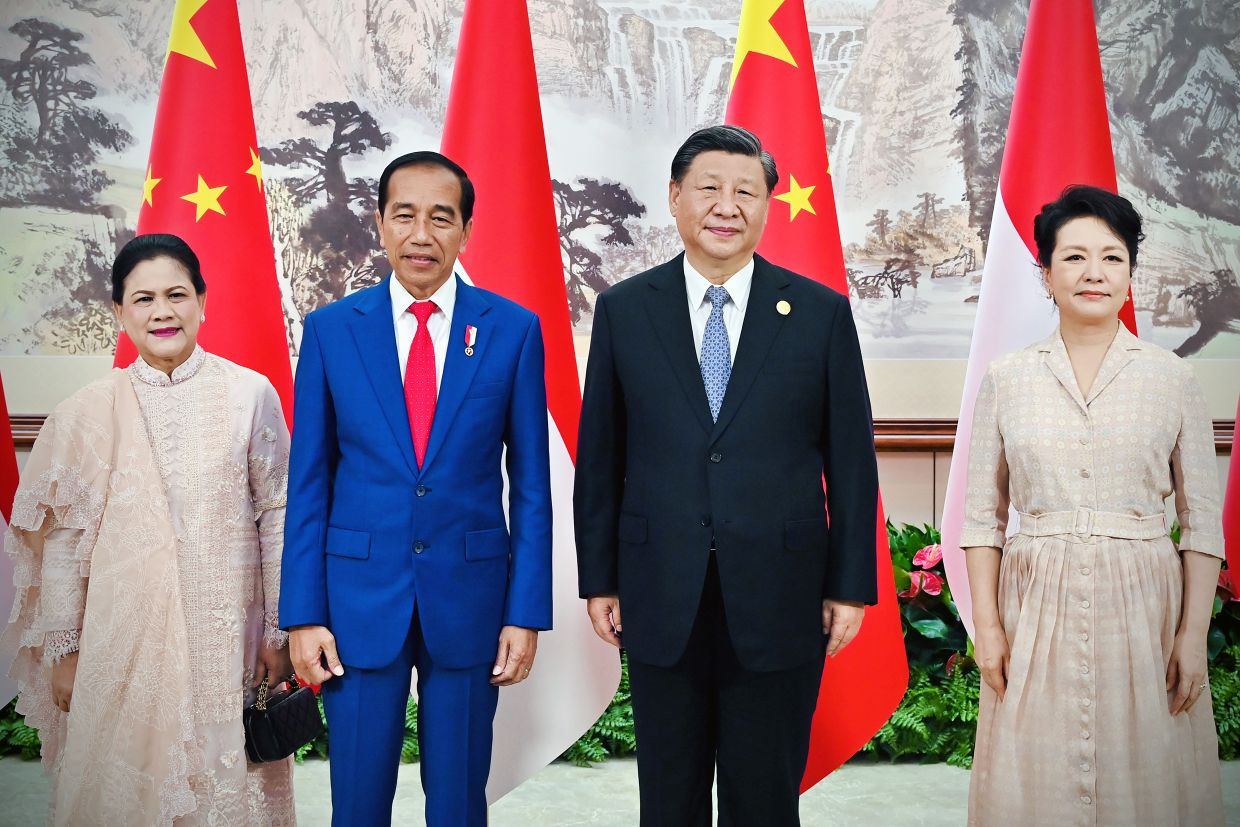Popular Reads
Top Results
Can't find what you're looking for?
View all search resultsPopular Reads
Top Results
Can't find what you're looking for?
View all search resultsJokowi, Xi upgrade economic, strategic relations
Two sides focused on mutually beneficial cooperation, Minister Retno says.
Change text size
Gift Premium Articles
to Anyone
P
resident Joko “Jokowi” Widodo came away on Thursday from a bilateral meeting with Chinese President Xi Jinping with a number of deals on trade and investment, capital city planning and health cooperation, as well as plans to strengthen the strategic relationship with Beijing, on the first day of a two-day visit to Chengdu, China.
Jokowi arrived in China’s fourth-most populous city, where he was expected to pitch investment opportunities in Indonesia’s critical minerals industry to Chinese businesses.
The visit also coincides with the 10th anniversary of the China-Indonesia strategic comprehensive partnership. Speaking to the press ahead of his flight from Halim Perdanakusuma International Airport in East Jakarta, the President said he would broach a number of subjects with the Chinese president, ranging from investments and strategic projects, to trade and health, but also regional and global issues.
“China is Indonesia’s largest trade and investment partner,” Jokowi told reporters ahead of his flight.
To help the nation achieve its ambition of becoming a high-income country in the next two decades, the government has intensified relations with Xi’s China, considered a reliable development partner despite creeping issues of debt and project delays.
Crucial to the 2025-2045 National Long-Term Development Plan (RPJPN) is the downstreaming of Indonesia’s critical minerals sector, which seeks to turn the country into an electric vehicle (EV) battery production hub as global demand for such products continues to rise.
Previously, senior officials have said that the China trip would be used to make a hard sales pitch with new incentives for Chinese businesses, including local EV giant BYD, in hopes of securing investments.
The President reiterated the plan again on Thursday.
“I will meet various Chinese CEOs that have, or are planning, to invest in Indonesia, especially for the downstreaming of industrial sectors like petrochemicals, renewable energy and health,” Jokowi said, while also confirming that EVs would be among his talking points. In the bilateral meeting, Foreign Minister Retno LP Marsudi said the two leaders explored ways to enhance their economic relations, saying that there was still much-untapped potential for future collaboration despite Beijing already taking the second spot among Jakarta’s top investors.
“[They] focused mostly on mutually beneficial economic cooperation, that which considers the local workforce and is environmentally friendly,” Retno said in a subtle reference to criticism over an existing Indonesia-China project.
China’s nickel smelter plant in Morowali, Central Sulawesi, has drawn ire since its establishment in 2021, with activists pointing to environmental degradation and poor working conditions. In January, clashes broke out between local workers and Chinese nationals.
The two leaders also discussed regional and global issues of common concern, including on Indo-Pacific cooperation and China’s support for the centrality of ASEAN.
“The President said that rivalry between major powers must be managed so as not to cause conflicts that are detrimental to the region. He welcomed the resumption of communication between China and the United States,” Retno said.
After meeting Xi, the President witnessed the signing of protocols to ease requirements for Indonesian exports, an action plan on health cooperation, a deal on joint research and the transfer of knowledge in capital city planning, according to a statement from the Presidential Secretariat.
On China’s part, Xi said China was willing to “initiate the ‘two-plus-two’ dialogue mechanism for foreign and defense ministers” and build “high-level strategic mutual trust”, state news outlet China Daily reported.
Strategic alliance
While attracting Chinese manufacturers would prove useful for Indonesia’s EV ambitions, Indonesia’s business lobbying group has noted that having Beijing’s support on the matter would provide Jakarta with a much-needed boost to realize its goals for downstreaming in commodities other than nickel.
In recent years, officials in Jakarta have made their intentions clear that domestically processing nickel was only a starting point to a larger downstreaming plan, which would involve other key minerals abundant in Indonesia, such as iron ore, bauxite, tin and aluminum.
This plan will require new industrial ecosystems, the establishment of which would in turn require a lot of external support such as transfers of technology and knowledge sharing, which analysts suggest are currently unavailable but could be achieved with the help of China.
“We are hoping that China can be a stronger partner for this ecosystem, such that we can be part of its global value chain,” said Bernardino Vega, deputy chairman for international relations at the Indonesian Chamber of Commerce and Industry (Kadin), on Thursday. “China is a big economy, we cannot ignore it,” he added.










